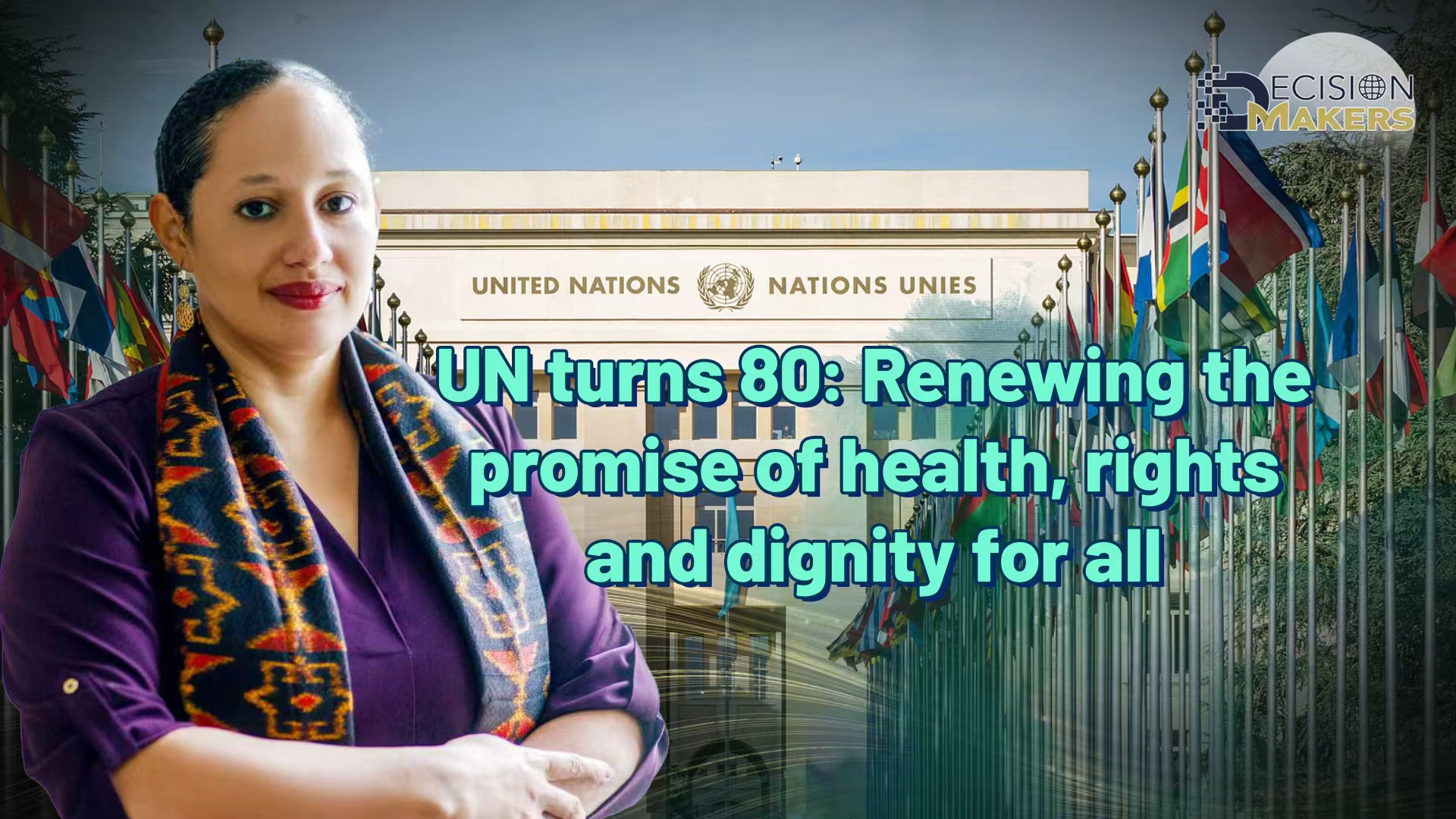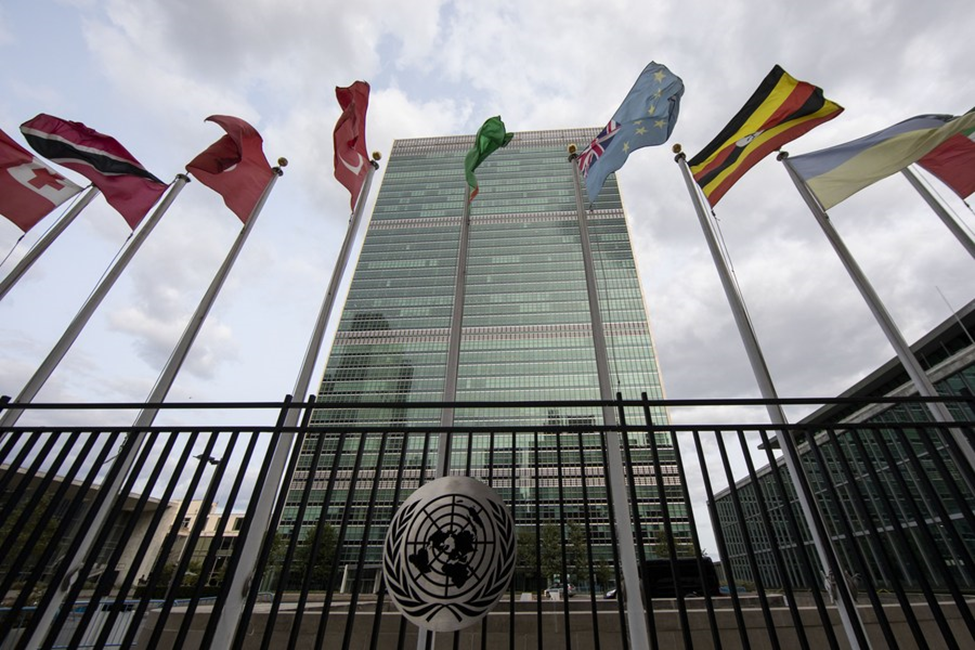
Editor's note: Decision Makers is a global platform for decision makers to share their insights on events shaping today's world. Nadia Rasheed is representative of the United Nations Population Fund (UNFPA) in China and country director of UNFPA in Mongolia. The article reflects the author's opinions and not necessarily the views of CGTN.
October 24 marks a foundational moment for international cooperation and human progress. Eighty years ago, the United Nations officially came into existence, carrying a vision of peace and hope for a better future – a world free of war, with higher standards of living and respect for fundamental human rights.
Over the decades, this vision has been translated into action through the work of UN funds, programs and specialized agencies, each addressing critical aspects of the UN's mandate and advancing human development across the globe.
The United Nations Population Fund (UNFPA) began operating in 1967 in response to growing global concern about demographic change, initially as the United Nations Trust Fund for Population Activities. Four years later, it became a permanent entity within the UN system. From its earliest days, UNFPA supported population censuses, trained a generation of demographers, strengthened maternal health programs and expanded access to life-saving contraceptives and maternal health medicines.
A pivotal moment in the global conversation on population occurred in 1994 with the International Conference on Population and Development (ICPD) in Cairo. The ICPD Program of Action highlighted the crucial links among population, development, and sexual and reproductive health and rights. It affirmed that empowering women and investing in young people are essential for sustainable development and called for the elimination of gender-based violence and harmful practices such as female genital mutilation. One year later, these commitments were reinforced at the Fourth World Conference on Women in Beijing, which adopted the Beijing Platform for Action – a landmark global agenda for achieving gender equality.
Building on these frameworks, UNFPA became known as the UN's sexual and reproductive health agency, advocating for health, rights and dignity. Today, it operates in more than 150 countries, helping to ensure that every pregnancy is wanted, every childbirth is safe and every young person fulfills its potential. UNFPA also supports countries in navigating the impacts of demographic change and in building resilience within health and social systems.
UNFPA's cooperation with China began in 1979 with the signing of a memorandum of understanding. In the first decade of collaboration, the organization supported the country's first modern census in 1982, strengthened efforts to reduce maternal and infant deaths, expanded contraceptive choices and contributed to the training of demographers and the establishment of demography as a discipline.
As China rapidly developed, UNFPA's support evolved to prioritize underserved and remote areas, extend services to migrants, young people and ethnic minorities and advance gender-sensitive and client-centred reproductive health initiatives – all in alignment with ICPD principles. Complementing the work of other UN agencies, UNFPA also contributed to HIV prevention and crisis response, such as after the 2008 Sichuan earthquake.

The outside view of the United Nations headquarters in New York, the United States. September 14, 2020 /Xinhua
The China-UNFPA partnership has extended globally, supporting developing countries to accelerate progress toward the Sustainable Development Goals (SDGs), particularly in health and gender equality. Joint initiatives with partner countries in Africa and Asia have expanded access to life-saving sexual and reproductive health services and strengthened health systems.
In Sierra Leone, for instance, the partnership enabled the development and launch of the country's first national strategy to eliminate cervical cancer. It introduced cervical cancer screening for the first time in the public sector. Across countries, these collaborations are helping to improve maternal health, empower women and young people and advance the shared vision of the ICPD and Beijing Platforms for Action.
In 2026, UNFPA will begin implementing its 10th Country Program in China. Recognizing China's remarkable economic growth and development, the program will focus on policy support to address emerging challenges and persistent inequalities that hinder progress on the ICPD and SDG agendas.
The program's goal is to help build population resilience and ensure universal access to sexual and reproductive health and rights by reducing inequalities and improving reach to those in vulnerable situations. It will also promote cross-country exchanges and sharing of experiences and best practices to advance the SDGs both in China and around the world.
As we look ahead, eight decades after the founding of the UN and three decades after the Cairo and Beijing conferences, global commitments to multilateralism, gender equality and reproductive rights face unprecedented challenges. Yet, in a world confronted with conflict, crises and fragmentation, the principles that inspired the UN's creation are more essential than ever for addressing today's global challenges.
This week in Beijing, leaders from around the world commemorated 30 years of the Beijing Platform for Action, renewing hope for a better future and underscoring the critical role of the UN. Under the leadership of the government of China and in collaboration with UN Women, the gathering emphasized that the Beijing Platform and the promise of gender equality are as relevant today as when they were adopted.
Leading the Global Leaders' Meeting on Women, Chinese President Xi Jinping pledged significant financing to support the global cause of women and called for a new chapter in promoting global cooperation on women, with women as key players in global governance and the Global Governance Initiative.
The conference served as a powerful reminder that the vision that began in 1945 remains vital. Eighty years on, the UN continues to inspire hope, reaffirming that through cooperation and shared purpose, we can build a more just, equal and peaceful world for all. UNFPA's work – ensuring sexual and reproductive health and rights, advancing gender equality, empowering young people and building demographic resilience – is central to realizing that promise.


